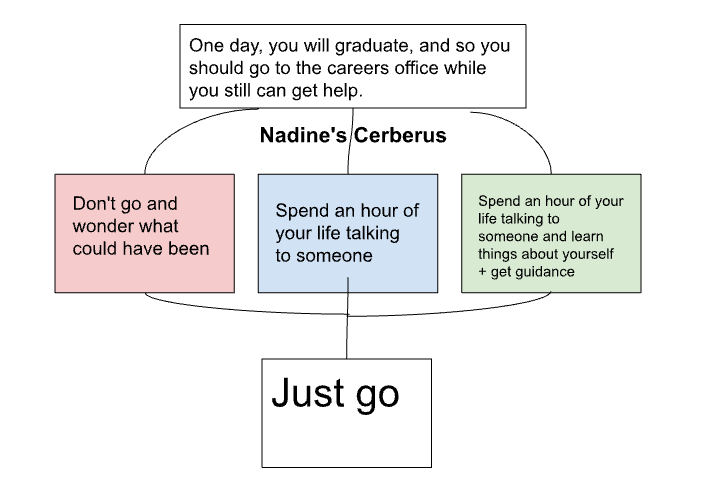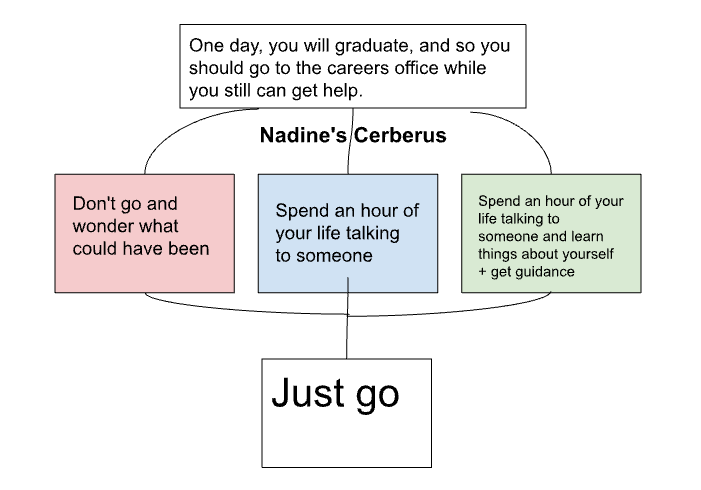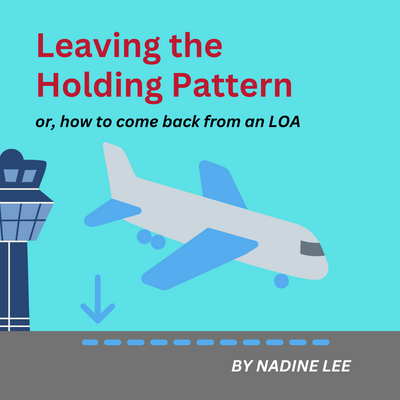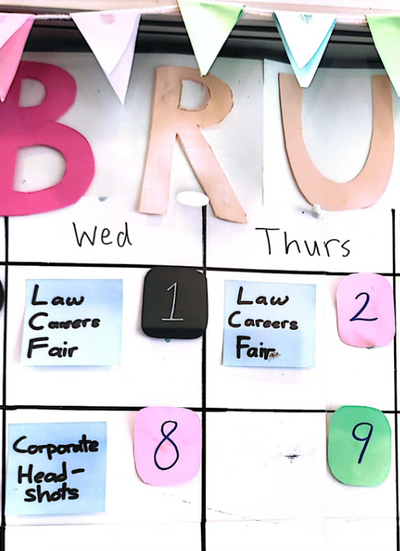"Okay, but I really don't want to become a lawyer. I feel lonely. I feel like everyone else is gunning for the same things. I mean. I don't envy people worrying about summer internships and the TC thing. But if I'm not doing the law firm internship and the TC thing, then I'm doing something else, and I have an idea of what I'm going to do. I think so at least?"
The Impetus
For the uninitiated or the confused, I will clarify the term 'career counselor'. Though the student populace generally calls our career advisors 'counselors', they are not counselors, that is, they do not usually hold a Masters in Counselling or any of the qualifications that the counselors and psychologists in the University Counseling Services@UHC (UCS) do.
If anything, they're closer to counsel-ors than counselors, since all of them have star-studded professional backgrounds in the legal industry. This makes sense, because there is literally no other way they would have so many contacts in the industry to refer law students to.
So, actually, they call themselves 'career coaches', or 'career advisors', to better reflect the scope of their work.
Perhaps the misconception comes from the fact that a career, or a perceived lack of one, does cause mental distress. Many students do go to the UCS to talk about their stress, and stress about jobs really isn't uncommon at all. So when setting up a LinkedIn and searching (every keyword related to your major) + "intern" stops being enough, or when graduation feels like falling off into an abyss, maybe a visit to the career advisor is in order.
That's not why I went to the career advisor, though – I went after an academic consult with a professor led me to rambling about how stressed I was about my future prospects.
He told me, "First thing after this, you go and book an appointment with the career advisor."
Void of any real reason to say no, and also in line with a New Semester's resolution to use the resources at hand, I booked an appointment.
Hence I found myself outside a career advisor's office after my Consti tutorial. I people-watched a bit, trying to soothe nerves I didn't know were frayed. It really didn't help that most of the people passing by were participating in the TSMP Moot being held that day and, as a result, were all dressed up and looking like they had a grip on things, and already had a dream practice group in a dream firm, or something like that.
For reference, 16 January 2024 was the second day of Sem 2.
I don't recommend giving yourself time to ruminate before heading to the career advisor's office. You can do plenty of that in there, with the added bonus of having an actual adult to catch you if you explode from stress.
The Appointment
The row of offices was very quiet in that late-afternoon daze sort of way, and my shoes kept making that embarrassing skid sound on the floor. My bag, resplendent with acrylic charms of Genshin Impact characters, was jangling with every step I took, only adding to my humiliation.
I wasn't sure what to expect from my appointment. I'd received an automated email from NUS' Centre for Future-Ready Graduates (CFG) the other day after setting a date with the advisor. It asked me to view some courses on the CFG website, send my advisor my resume (which I had), a cover letter if I had one (I did not), and do a sample interview on a mock interview website.
In truth, I did feel kind of guilty as I knocked on the advisor's door. It didn't feel right to take up the career advisor's time, knowing that I didn't really want to go into practice. But the professor who had recommended I go to the advisor had assured me that even if I wasn't looking for a job in the legal industry, they would be able to "make magic happen".
The session started off with the advisor offering me some boiling hot water that she'd heated up for her tea. (I had a bad cough, an empty bottle, and too much pride to run to the water cooler now that I'd entered her office.)
I received the water gratefully, and at her invitation to 'tell me more about [myself]', started talking. About myself. And why I was there.
Telling her that this appointment was the logical conclusion to my professor seeing how in arrears I was – that wouldn't fly. And it wasn't actually true, because now that I was sitting opposite the career advisor, under the purview of NUS CFG, feeling less like a future-ready graduate and more like a future-fearful undergrad, a pit opened up in my stomach.
She explained that she always let the student speak first. How the advisor managed to parse through my soliloquy and retain the details – I don't know, but she did. Then, she asked me if I would like to hear about the different areas of law, and gave me a deep-dive into practice areas. I'd been advised by my professor not to turn my back entirely on legal practice (at time of writing, I've not even completed my core mods, so maybe one day I'll look back on this article in a law firm's associate's desk and laugh). Their advice did have some merit to it, so I listened as the career advisor explain most areas of practice, as well as point out some practice areas she thought suited my interests.
That was another thing about the session – much of what came out of my mouth might have been stress-induced garbage, but the advisor had a way of stepping through the trash and picking out what she thought my motivations were. Not just for a career, but also my life.
Like: Would I have to find meaning in my job, or was I okay working and finding meaning elsewhere? How do you reconcile having a job and also maintaining your happiness? If there's some good half-eaten food in the office pantry and it's unlabeled, to what extent is it wrong to take it for yourself? What kind of job would offer me the stability to live until I was old enough to withdraw my CPF money? Did I even want to stay in Singapore for the foreseeable future?
These concerns are evidently specific to the situation I was facing, and I threw some lies in the above paragraph to throw you off. Later, I realized I'd gotten some good, valuable advice that actually felt tailored to me and my situation.
(Some awesome general advice, though, was to use the CFG's resources and subscription to Forage, which is like Coursera for jobs. Forage hosts a bunch of 'virtual internships' designed by companies in any industry you can care to name, where you do work that an intern might be assigned, like preparing a brief or drafting an email to an irate client. You get a certificate, and like it's read your mind, Forage lets you directly add it to your LinkedIn.)
I didn't find all the answers to the above-mentioned questions during my appointment, but the advisor said I could book a follow-up session if I ever needed more guidance. Also, some of these questions weren't really answerable – just things that I had to go home with and sit on.
What I was surprised to feel was an overwhelming sense of relief. I'd been holding on to some tension and stress, unbeknownst to even myself, and speaking to the career advisor had cast them into the light for further inspection. There's a constant worry I imagine is shared by many reading this – the fear of not knowing what you don't know. Thankfully, I left the session feeling like I now knew what I didn't know.
It's at this juncture that I recommend everyone go to the Careers Office at least once. Maybe not everyone all at once, obviously. But if you have the time, you should use the resources provided to you and just go, even if you aren't looking for a job or internship, regardless of how you perceive yourself job-wise. Sometimes it's just good to sit down and talk it out. It definitely was the case for me.
Anyway, my session wrapped up as I killed a mosquito bulging with blood. As thanks, the advisor offered me a sticker. It's on the back of my phone at time of writing.
The Wager
Call it what you want – Pascal's wager, Roko's basilisk, whatever. From a pragmatist's standpoint, it makes sense to utilise the resources at hand, if not for the fact that your life will remain either neutral or get marginally better because you've found some more meaning.
Consider this a modified version of Roko's basilisk. Roko's basilisk is the unhinged tech bro belief that we should never speak badly of AI and actively work towards improving it, in fear that one day a sentient AI may appear and begin torturing those who spoke out against AI or did not help it develop. Simply put, the alternative if we do not help AI is eternal damnation via sentient 64-bit hellfire.
This is Nadine's Cerberus, named for the way my thought model resembles the three-headed dog – it is the much smarter approach that posits that you should try going to the career advisor at least once in your tenure here, because the alternative is never having given it a chance while you could.
At best, you leave with 10 actionable steps or whatever it is venture capitalists like to say. At worst, you leave with an hour of your afternoon gone. And what were you going to do with that hour that was so important anyway?

And if you aren't a pragmatic person, then just be a sensible one and let Nadine from Justified tell you what to do.






